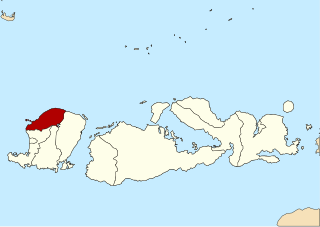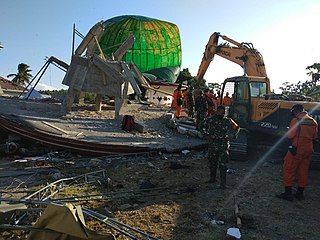
Minangkabau people, also known as Minang, are an Austronesian ethnic group native to the Minangkabau Highlands of West Sumatra, Indonesia. The Minangkabau's West Sumatran homelands was the seat of the Pagaruyung Kingdom, believed by early historians to have been the cradle of the Malay race, and the location of the Padri War.

West Sumatra is a province of Indonesia. It is on the west coast of the island of Sumatra and includes the Mentawai Islands off that coast. West Sumatra borders the Indian Ocean to the west, as well as the provinces of North Sumatra to the north, Riau to the northeast, Jambi to the southeast, and Bengkulu to the south. The province has an area of 42,119.54 km2 (16,262.45 sq mi), with a population of 5,534,472 at the 2020 census. The official estimate at mid 2022 was 5,640,629. The province is subdivided into twelve regencies and seven cities. It has relatively more cities than other provinces outside Java, although several of them are relatively low in population compared with cities elsewhere in Indonesia. Padang is the province's capital and largest city.

Denpasar is the capital city of the province of Bali, Indonesia. Denpasar is the main gateway to the Bali island, the city is also a hub for other cities in the Lesser Sunda Islands.

Banyumas Regency is a regency in the southwestern part of Central Java province in Indonesia. Its capital is the town of Purwokerto, but that town no longer has a central administration and is split over four of the districts within the Regency, with a combined population of 231,765 as at mid 2022. The Regency covers an area of 1,327.59 km2, and had a population of 1,554,527 at the 2010 Census and 1,776,918 at the 2020 Census; the official estimate of population as at mid 2022 was 1,806,814.
Indonesia is divided into provinces. Provinces are made up of regencies and cities (kota). Provinces, regencies, and cities have their own local governments and parliamentary bodies.
In Indonesia, village or subdistrict is the fourth-level subdivision and the smallest administrative division of Indonesia below a district, regency/city, and province. Similar administrative divisions outside of Indonesia include barangays in the Philippines, Muban in Thailand, civil townships and incorporated municipalities in the United States and Canada, communes in France and Vietnam, dehestan in Iran, hromada in Ukraine, Gemeinden in Germany, comuni in Italy, or municipios in Spain. The UK equivalent are civil parishes and communities in Wales. There are a number of names and types for villages in Indonesia, with desa being the most frequently used for regencies and kelurahan for cities. According to the 2019 report by the Ministry of Home Affairs, there are 8,488 urban villages and 74,953 rural villages in Indonesia. North Aceh Regency contained the highest number of rural villages (852) amongst all of the regencies of Indonesia, followed by Pidie Regency with 730 rural villages and Bireuen Regency with 609 rural villages. Prabumulih, with only 12 rural villages, contained the fewest. Counted together, the sixteen regencies of Indonesia containing the most rural villages—namely, North Aceh (852), Pidie (730), Bireuen (609), Aceh Besar (604), Tolikara (541), East Aceh (513), Yahukimo (510), Purworejo (469), Lamongan (462), South Nias (459), Kebumen (449), Garut (421), Bojonegoro (419), Bogor (416), Cirebon (412), and Pati (401)—contain one-third of all the rural villages in Indonesia. Five of these are located in Aceh, two in Highland Papua, three in Central Java, two in East Java, three in West Java, and one in North Sumatra. An average number of rural villages in the regencies and 15 cities of Indonesia is 172 villages. A village is the lowest administrative division in Indonesia, and it is the lowest of the four levels. A village is usually divided into a number of hamlets, and there are 252,315 hamlets in Indonesia.

The architecture of Indonesia reflects the diversity of cultural, historical and geographic influences that have shaped Indonesia as a whole. Invaders, colonizers, missionaries, merchants and traders brought cultural changes that had a profound effect on building styles and techniques.
Merigi is a district (kecamatan) of Kepahiang Regency, Bengkulu, Indonesia.

West Lombok Regency is a regency of the Indonesian Province of West Nusa Tenggara. It is located on the island of Lombok and the administrative capital is the town of Gerung. The regency covers an area of 922.91 km2 and had a population of 599,609 at the 2010 census and 721,481 at the 2020 census; the official estimate as at mid 2021 was 744,309.

East Lombok Regency is a regency of the Indonesian Province of West Nusa Tenggara. It is located on the island of Lombok, of which it comprises the eastern third ; the administrative capital is the town of Selong. The Regency covers an area of 1,605.55 km2 and had a population of 1,105,582 at the 2010 Census and 1,325,240 at the 2020 Census; the official estimate as at mid 2022 was 1,366,434.

Central Lombok Regency is a regency of the Indonesian Province of West Nusa Tenggara. It is located on the island of Lombok and the capital is Praya. It covers an area of 1,208.39 km2, and had a population of 859,309 at the 2010 census and 1,034,859 at the 2020 census; the official estimate as at mid 2022 was 1,067,682.

North Lombok Regency is a regency of the Indonesian Province of West Nusa Tenggara. It is located on the island of Lombok and the capital is Tanjung situated on the northwest coast of the island. The regency covers an area of 809.53 km2 and had a population of 200,072 at the 2010 Census and 247,400 at the 2020 Census; the official estimate as at mid 2022 was 256,438.

Penajam North Paser Regency is a regency in the Indonesian province of East Kalimantan. Its administrative centre is the town of Penajam. The area which now forms Penajam North Paser was part of Paser Regency until its creation as a separate regency on 10 April 2002. It covers an area of 3,333.06 km2 and it had 142,922 inhabitants at the 2010 census and 178,681 at the 2020 census; the official estimate as at mid 2022 was 183,043. Penajam North Paser Regency has the smallest area among the seven regencies in East Kalimantan province.

The national costume of Indonesia is the national attire that represents the Republic of Indonesia. It is derived from Indonesian culture and Indonesian traditional textile traditions. Today the most widely recognized Indonesian national attires include batik and kebaya, although originally those attires mainly belong within the island of Java and Bali, most prominently within Javanese, Sundanese and Balinese culture. Since Java has been the political and population center of Indonesia, folk attire from the island has become elevated into national status.

Wapauwe Old Mosque is a historic mosque in Kaitetu village, a village in the Wawane Mountains on the north part of cape Keitetu, Maluku, Indonesia. Established in 1414, it is the oldest mosque in the Moluccas and possibly the oldest mosque in Indonesia which has been maintained in its original state.

Bayan Beleq Mosque is the oldest mosque on the island of Lombok, Indonesia, reportedly dating back to 1634. It is located in Bayan village.

On 5 August 2018, a destructive and shallow earthquake measuring Mw 6.9 struck the island of Lombok, Indonesia. It was the main shock following its foreshock, a nearby Mw 6.4 earthquake on 29 July. It was followed by a nearby 6.9 earthquake on 19 August 2018.

Penglipuran Village is one of the traditional villages located in Bangli Regency, Bali Province, Indonesia. Penglipuran village is famous as one of the tourist destinations in Bali because of its society who still preserve their traditional culture in their daily lives. The architecture of buildings and land processing still follows the concept of Tri Hita Karana, the philosophy of Balinese society regarding the balance of relations between God, humans and their environment. Penglipuran Village succeeded in building tourism that benefited all of their communities without losing their culture and traditions. In 1995, Penglipuran Village also received a Kalpataru award from the Indonesian Government for its efforts to protect the Bamboo Forest in their local ecosystem.
The 2021 Bali earthquake struck at 04:18 local time (UTC+08:00) when people were still sleeping on 15 October 2021. It resulted in 4 deaths and 73 more injured, despite having a moment magnitude of 4.7.

The Minangkabau Malaysians are citizens of the Malaysia whose ancestral roots are from Minangkabau of central Sumatra. This includes people born in the Malaysia who are of Minangkabau origin as well as Minangkabau who have migrated to Malaysia. Today, Minangkabau comprise about 989,000 people in Malaysia, and Malaysian law considers most of them to be Malays. They are majority in urban areas, which has traditionally had the highest education and a strong entrepreneurial spirit. The history of the Minangkabau migration to Malay peninsula has been recorded to have lasted a very long time. When the means of transportation were still using the ships by down the rivers and crossing the strait, many Minang people migrated to various regions such as Negeri Sembilan, Malacca, Penang, Kedah, Perak, and Pahang. Some scholars noted that the arrival of the Minangkabau to the Malay Peninsula occurred in the 12th century. This ethnic group moved in to peninsula at the height of the Sultanate of Malacca, and maintains the Adat Perpatih of matrilineal kinships system in Negeri Sembilan and north Malacca.





















